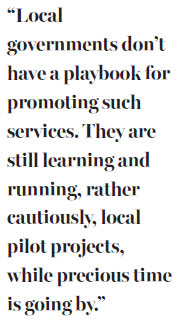Services, not steel mills, needed now

Measuring China's reforms by state-owned industries misses point, when what's called for is encouragement of small business
There is little doubt that the second half of 2016 will be an eventful, if not tumultuous, time. For China-based investors, opportunity doesn't look pretty either in the long term or the short term - hence, the slowdown in the private sector, which is closely related with services, the renewed interest in gold along with the fall in the yuan in the currency market, and a drain of capital worth probably 500 billion yuan ($74.8 billion; 67.4 billion euros) in recent months.
However, the world isn't a safe place, either. Brexit is unlikely to be the last crisis of the year. Where can investors find a place to get better value for their money? With the falling yuan-dollar rate, Chinese investors will find overseas assets become increasingly more expensive.
In investment circles, a popular saying goes that whatever you do, you just can't get a good return (as quickly as before). With such sentiment, one may wonder, where is confidence?

At some recent overseas property shows in China's main cities - all about housing units in prime locations - one could discern a rising sense of hesitation from loud chatter among potential buyers.
Individual investors are simple people. Whatever they buy, or keep, they just want certainty. And right now, in a world of excessive capacity, certainty is in a short supply. That's exactly why money changers, by throwing out a few selected facts, can win over middle-class customers by telling them that keeping more foreign currency is a "broad exit" to "prosperity".
The drain in capital is driven by a drain in confidence. And the drain in confidence reflects a drain in patience about reform. But overseas observers may be mistaken to say it is a protest against the slow progress, if not a standstill, in the reform of state-owned enterprises.
Things like large oil companies and steel mills used to look very attractive in the time of high growth. But that's over. Now, in an economy plagued by overcapacity, they are losing their luster. Their management and staff are not very competitive in the first place. And their tradition has not accumulated a reserve of new technologies and managerial methods for the future. Times have changed. Private investors don't want them.
So it is no longer useful to assess China's change by measuring its SOE reform.

Private investors have never prepared for running large industries directly after all. The authorities' concerns about industry's total privatization is unfounded.
To provide more opportunities to private investors, and more attractive options to them than overseas housing estates, what China may do is open up more avenues for running smaller services, such as community-level schools, training facilities, clinics and retirement care centers.
The biggest problem is not so much that the government insists on a monopoly of such services. There are laws and government decrees that permit their existence. In practice, industry-level and city-level bureaucracies are far from doing what they can to make them happen in large numbers.
They are not considered part of the social security networks. Customers don't get reimbursed after buying their services. Patients, for instance, have to line up in long queues at large state-run clinics if they want to save money.
Because of a lack of a friendly regulatory environment, retired medical professionals - there are many of them in cities like Beijing and Shanghai - are not showing a strong interest in earning extra income running their own services. On a societal basis, that results in a tremendous waste of human capital and opportunity cost.
Local governments don't have a playbook for promoting such services. They are still learning and running, rather cautiously, local pilot projects, while precious time is going by. The bureaucrats are not delivering as much benefit to the people as reform could have generated. This may also be why, in his speech to mark the 95th anniversary of the founding of the Communist Party of China on July 1, President Xi Jinping urged them to never betray the commitment to reform and their promise to the people.
The author is editor-at-large of China Daily. Contact the writer at edzhang@chinadaily.com.cn
(China Daily European Weekly 07/08/2016 page13)
Today's Top News
- Takaichi must stop rubbing salt in wounds, retract Taiwan remarks
- Millions vie for civil service jobs
- Chinese landmark trade corridor handles over 5m TEUs
- China holds first national civil service exam since raising eligibility age cap
- Xi's article on CPC self-reform to be published
- Xi stresses improving long-term mechanisms for cyberspace governance






























